Commercial and Corporation Law
VerifiedAdded on 2022/12/30
|13
|4394
|20
AI Summary
This document provides an analysis of two legal cases related to exclusion clauses in contracts. It discusses the reasonableness of exclusion clauses and the application of the Unfair Contract Terms Act of 1977. The cases involve Saint Gobain Building Distribution Ltd v Hillmead Joinery Ltd and Goodlife Foods Ltd v Hall Fire Protection Ltd. The document also includes a discussion on the liability of carriers under the Hague-Visby Rules in the context of damaged goods during transportation. The cases involve Floidex Limited and Coppens.
Contribute Materials
Your contribution can guide someone’s learning journey. Share your
documents today.
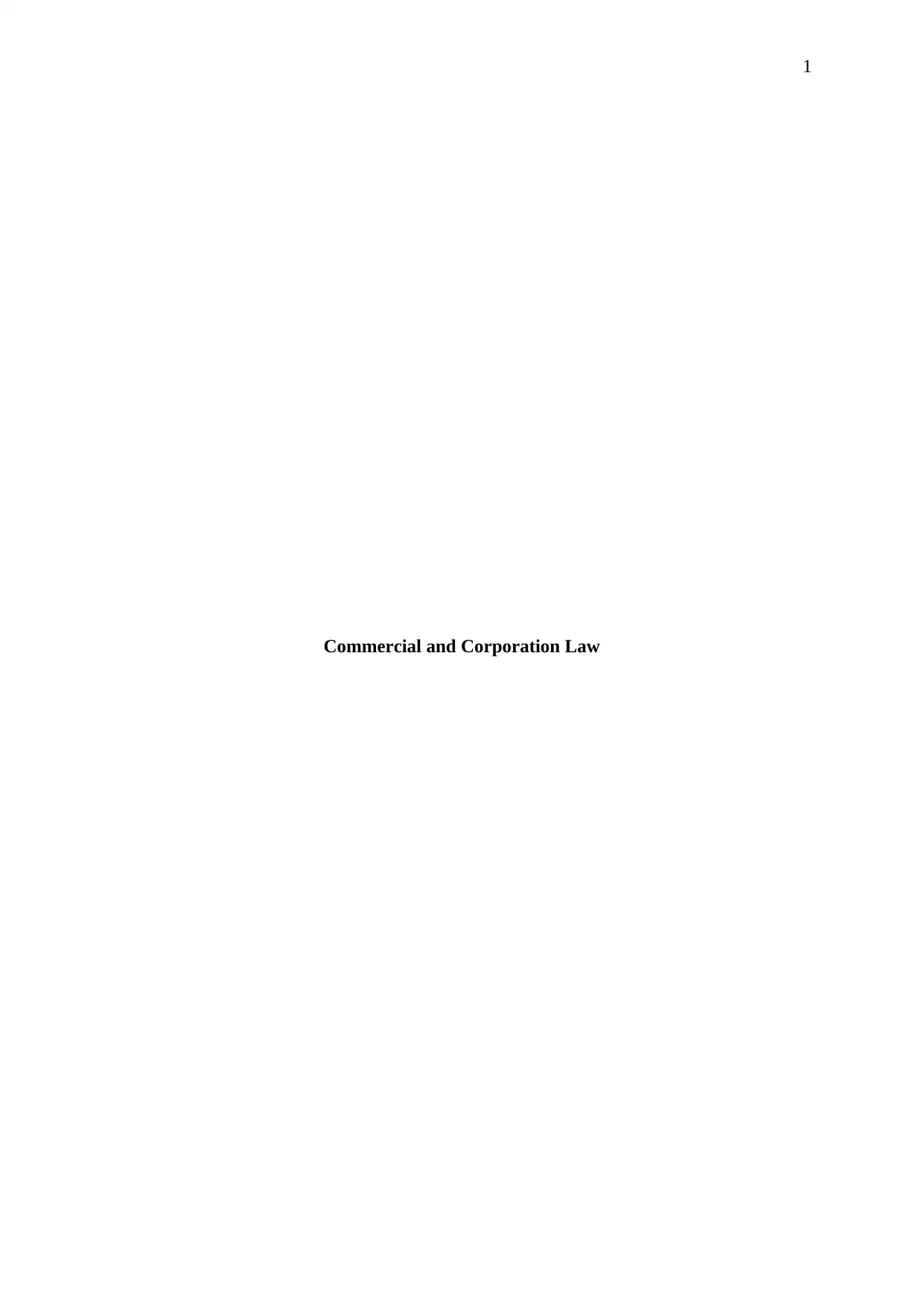
1
Commercial and Corporation Law
Commercial and Corporation Law
Secure Best Marks with AI Grader
Need help grading? Try our AI Grader for instant feedback on your assignments.
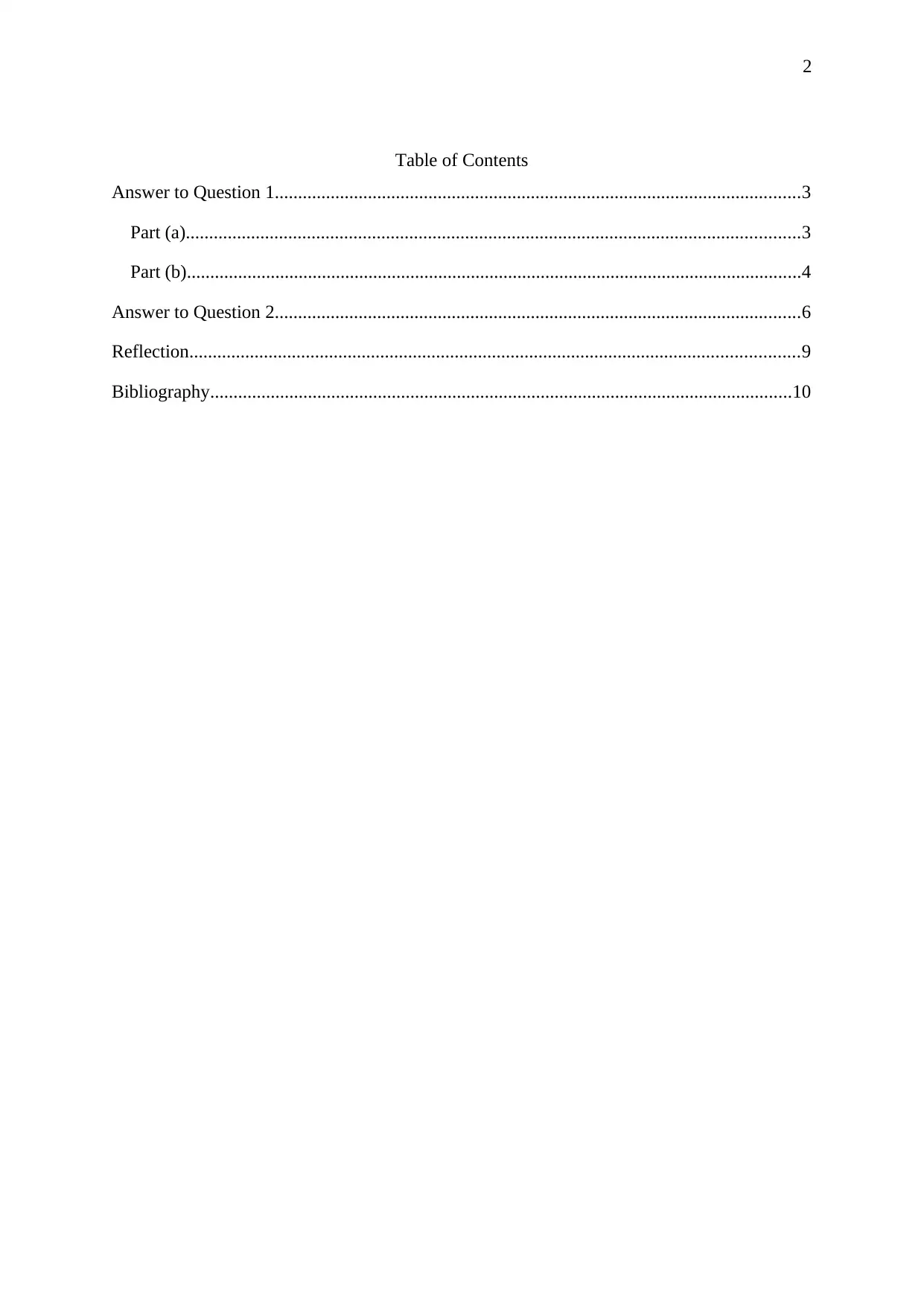
2
Table of Contents
Answer to Question 1.................................................................................................................3
Part (a)....................................................................................................................................3
Part (b)....................................................................................................................................4
Answer to Question 2.................................................................................................................6
Reflection...................................................................................................................................9
Bibliography.............................................................................................................................10
Table of Contents
Answer to Question 1.................................................................................................................3
Part (a)....................................................................................................................................3
Part (b)....................................................................................................................................4
Answer to Question 2.................................................................................................................6
Reflection...................................................................................................................................9
Bibliography.............................................................................................................................10
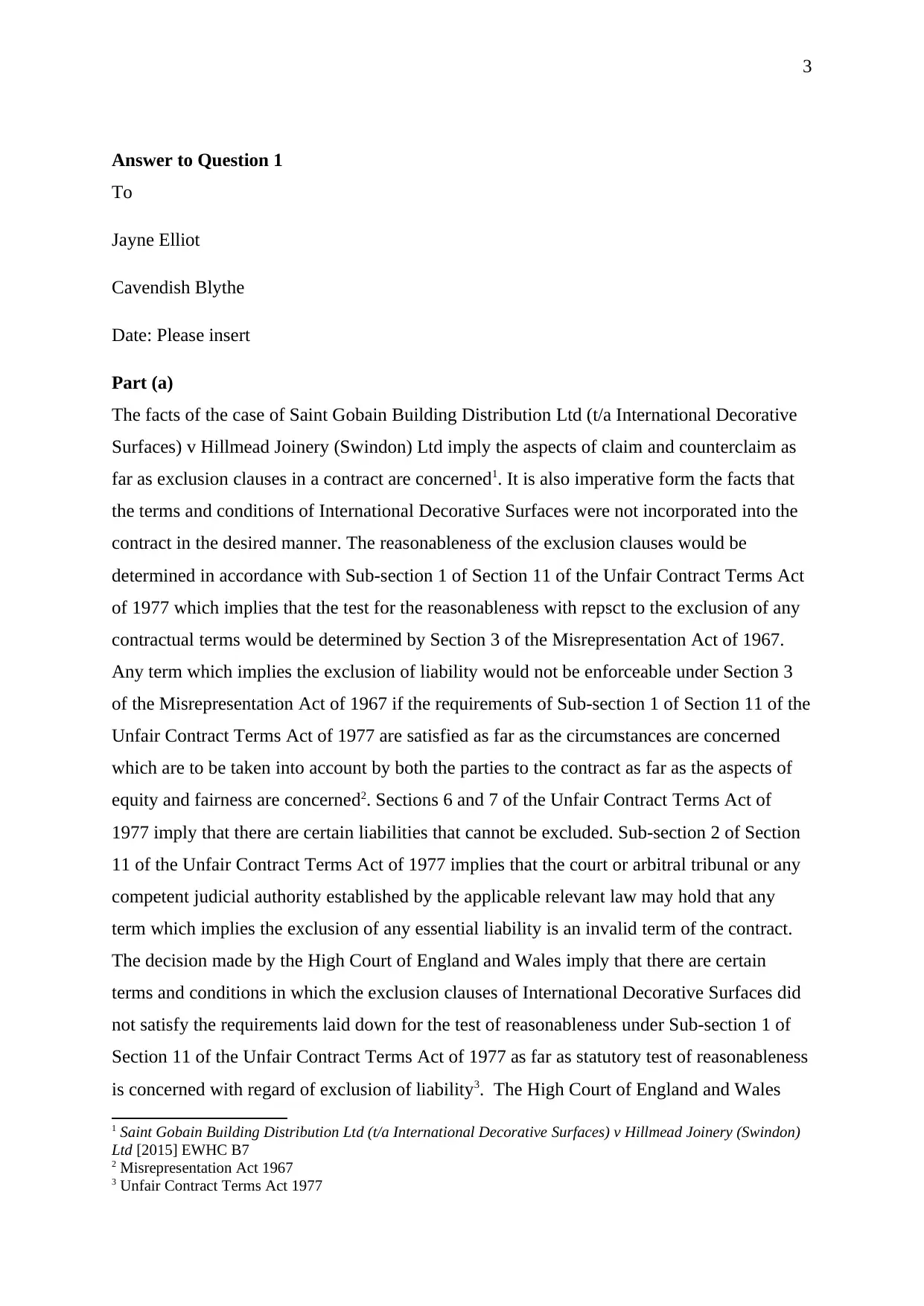
3
Answer to Question 1
To
Jayne Elliot
Cavendish Blythe
Date: Please insert
Part (a)
The facts of the case of Saint Gobain Building Distribution Ltd (t/a International Decorative
Surfaces) v Hillmead Joinery (Swindon) Ltd imply the aspects of claim and counterclaim as
far as exclusion clauses in a contract are concerned1. It is also imperative form the facts that
the terms and conditions of International Decorative Surfaces were not incorporated into the
contract in the desired manner. The reasonableness of the exclusion clauses would be
determined in accordance with Sub-section 1 of Section 11 of the Unfair Contract Terms Act
of 1977 which implies that the test for the reasonableness with repsct to the exclusion of any
contractual terms would be determined by Section 3 of the Misrepresentation Act of 1967.
Any term which implies the exclusion of liability would not be enforceable under Section 3
of the Misrepresentation Act of 1967 if the requirements of Sub-section 1 of Section 11 of the
Unfair Contract Terms Act of 1977 are satisfied as far as the circumstances are concerned
which are to be taken into account by both the parties to the contract as far as the aspects of
equity and fairness are concerned2. Sections 6 and 7 of the Unfair Contract Terms Act of
1977 imply that there are certain liabilities that cannot be excluded. Sub-section 2 of Section
11 of the Unfair Contract Terms Act of 1977 implies that the court or arbitral tribunal or any
competent judicial authority established by the applicable relevant law may hold that any
term which implies the exclusion of any essential liability is an invalid term of the contract.
The decision made by the High Court of England and Wales imply that there are certain
terms and conditions in which the exclusion clauses of International Decorative Surfaces did
not satisfy the requirements laid down for the test of reasonableness under Sub-section 1 of
Section 11 of the Unfair Contract Terms Act of 1977 as far as statutory test of reasonableness
is concerned with regard of exclusion of liability3. The High Court of England and Wales
1 Saint Gobain Building Distribution Ltd (t/a International Decorative Surfaces) v Hillmead Joinery (Swindon)
Ltd [2015] EWHC B7
2 Misrepresentation Act 1967
3 Unfair Contract Terms Act 1977
Answer to Question 1
To
Jayne Elliot
Cavendish Blythe
Date: Please insert
Part (a)
The facts of the case of Saint Gobain Building Distribution Ltd (t/a International Decorative
Surfaces) v Hillmead Joinery (Swindon) Ltd imply the aspects of claim and counterclaim as
far as exclusion clauses in a contract are concerned1. It is also imperative form the facts that
the terms and conditions of International Decorative Surfaces were not incorporated into the
contract in the desired manner. The reasonableness of the exclusion clauses would be
determined in accordance with Sub-section 1 of Section 11 of the Unfair Contract Terms Act
of 1977 which implies that the test for the reasonableness with repsct to the exclusion of any
contractual terms would be determined by Section 3 of the Misrepresentation Act of 1967.
Any term which implies the exclusion of liability would not be enforceable under Section 3
of the Misrepresentation Act of 1967 if the requirements of Sub-section 1 of Section 11 of the
Unfair Contract Terms Act of 1977 are satisfied as far as the circumstances are concerned
which are to be taken into account by both the parties to the contract as far as the aspects of
equity and fairness are concerned2. Sections 6 and 7 of the Unfair Contract Terms Act of
1977 imply that there are certain liabilities that cannot be excluded. Sub-section 2 of Section
11 of the Unfair Contract Terms Act of 1977 implies that the court or arbitral tribunal or any
competent judicial authority established by the applicable relevant law may hold that any
term which implies the exclusion of any essential liability is an invalid term of the contract.
The decision made by the High Court of England and Wales imply that there are certain
terms and conditions in which the exclusion clauses of International Decorative Surfaces did
not satisfy the requirements laid down for the test of reasonableness under Sub-section 1 of
Section 11 of the Unfair Contract Terms Act of 1977 as far as statutory test of reasonableness
is concerned with regard of exclusion of liability3. The High Court of England and Wales
1 Saint Gobain Building Distribution Ltd (t/a International Decorative Surfaces) v Hillmead Joinery (Swindon)
Ltd [2015] EWHC B7
2 Misrepresentation Act 1967
3 Unfair Contract Terms Act 1977
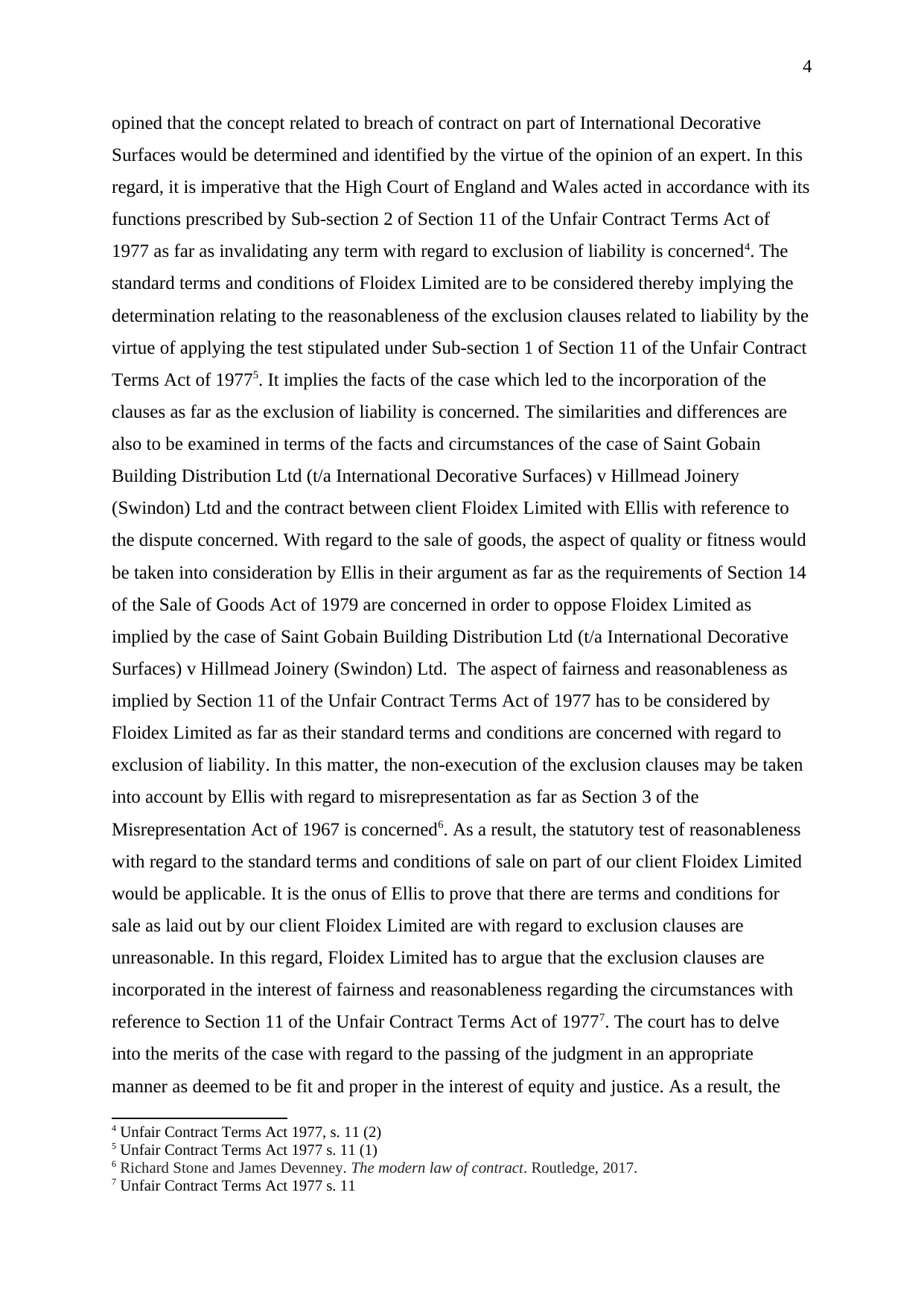
4
opined that the concept related to breach of contract on part of International Decorative
Surfaces would be determined and identified by the virtue of the opinion of an expert. In this
regard, it is imperative that the High Court of England and Wales acted in accordance with its
functions prescribed by Sub-section 2 of Section 11 of the Unfair Contract Terms Act of
1977 as far as invalidating any term with regard to exclusion of liability is concerned4. The
standard terms and conditions of Floidex Limited are to be considered thereby implying the
determination relating to the reasonableness of the exclusion clauses related to liability by the
virtue of applying the test stipulated under Sub-section 1 of Section 11 of the Unfair Contract
Terms Act of 19775. It implies the facts of the case which led to the incorporation of the
clauses as far as the exclusion of liability is concerned. The similarities and differences are
also to be examined in terms of the facts and circumstances of the case of Saint Gobain
Building Distribution Ltd (t/a International Decorative Surfaces) v Hillmead Joinery
(Swindon) Ltd and the contract between client Floidex Limited with Ellis with reference to
the dispute concerned. With regard to the sale of goods, the aspect of quality or fitness would
be taken into consideration by Ellis in their argument as far as the requirements of Section 14
of the Sale of Goods Act of 1979 are concerned in order to oppose Floidex Limited as
implied by the case of Saint Gobain Building Distribution Ltd (t/a International Decorative
Surfaces) v Hillmead Joinery (Swindon) Ltd. The aspect of fairness and reasonableness as
implied by Section 11 of the Unfair Contract Terms Act of 1977 has to be considered by
Floidex Limited as far as their standard terms and conditions are concerned with regard to
exclusion of liability. In this matter, the non-execution of the exclusion clauses may be taken
into account by Ellis with regard to misrepresentation as far as Section 3 of the
Misrepresentation Act of 1967 is concerned6. As a result, the statutory test of reasonableness
with regard to the standard terms and conditions of sale on part of our client Floidex Limited
would be applicable. It is the onus of Ellis to prove that there are terms and conditions for
sale as laid out by our client Floidex Limited are with regard to exclusion clauses are
unreasonable. In this regard, Floidex Limited has to argue that the exclusion clauses are
incorporated in the interest of fairness and reasonableness regarding the circumstances with
reference to Section 11 of the Unfair Contract Terms Act of 19777. The court has to delve
into the merits of the case with regard to the passing of the judgment in an appropriate
manner as deemed to be fit and proper in the interest of equity and justice. As a result, the
4 Unfair Contract Terms Act 1977, s. 11 (2)
5 Unfair Contract Terms Act 1977 s. 11 (1)
6 Richard Stone and James Devenney. The modern law of contract. Routledge, 2017.
7 Unfair Contract Terms Act 1977 s. 11
opined that the concept related to breach of contract on part of International Decorative
Surfaces would be determined and identified by the virtue of the opinion of an expert. In this
regard, it is imperative that the High Court of England and Wales acted in accordance with its
functions prescribed by Sub-section 2 of Section 11 of the Unfair Contract Terms Act of
1977 as far as invalidating any term with regard to exclusion of liability is concerned4. The
standard terms and conditions of Floidex Limited are to be considered thereby implying the
determination relating to the reasonableness of the exclusion clauses related to liability by the
virtue of applying the test stipulated under Sub-section 1 of Section 11 of the Unfair Contract
Terms Act of 19775. It implies the facts of the case which led to the incorporation of the
clauses as far as the exclusion of liability is concerned. The similarities and differences are
also to be examined in terms of the facts and circumstances of the case of Saint Gobain
Building Distribution Ltd (t/a International Decorative Surfaces) v Hillmead Joinery
(Swindon) Ltd and the contract between client Floidex Limited with Ellis with reference to
the dispute concerned. With regard to the sale of goods, the aspect of quality or fitness would
be taken into consideration by Ellis in their argument as far as the requirements of Section 14
of the Sale of Goods Act of 1979 are concerned in order to oppose Floidex Limited as
implied by the case of Saint Gobain Building Distribution Ltd (t/a International Decorative
Surfaces) v Hillmead Joinery (Swindon) Ltd. The aspect of fairness and reasonableness as
implied by Section 11 of the Unfair Contract Terms Act of 1977 has to be considered by
Floidex Limited as far as their standard terms and conditions are concerned with regard to
exclusion of liability. In this matter, the non-execution of the exclusion clauses may be taken
into account by Ellis with regard to misrepresentation as far as Section 3 of the
Misrepresentation Act of 1967 is concerned6. As a result, the statutory test of reasonableness
with regard to the standard terms and conditions of sale on part of our client Floidex Limited
would be applicable. It is the onus of Ellis to prove that there are terms and conditions for
sale as laid out by our client Floidex Limited are with regard to exclusion clauses are
unreasonable. In this regard, Floidex Limited has to argue that the exclusion clauses are
incorporated in the interest of fairness and reasonableness regarding the circumstances with
reference to Section 11 of the Unfair Contract Terms Act of 19777. The court has to delve
into the merits of the case with regard to the passing of the judgment in an appropriate
manner as deemed to be fit and proper in the interest of equity and justice. As a result, the
4 Unfair Contract Terms Act 1977, s. 11 (2)
5 Unfair Contract Terms Act 1977 s. 11 (1)
6 Richard Stone and James Devenney. The modern law of contract. Routledge, 2017.
7 Unfair Contract Terms Act 1977 s. 11
Secure Best Marks with AI Grader
Need help grading? Try our AI Grader for instant feedback on your assignments.
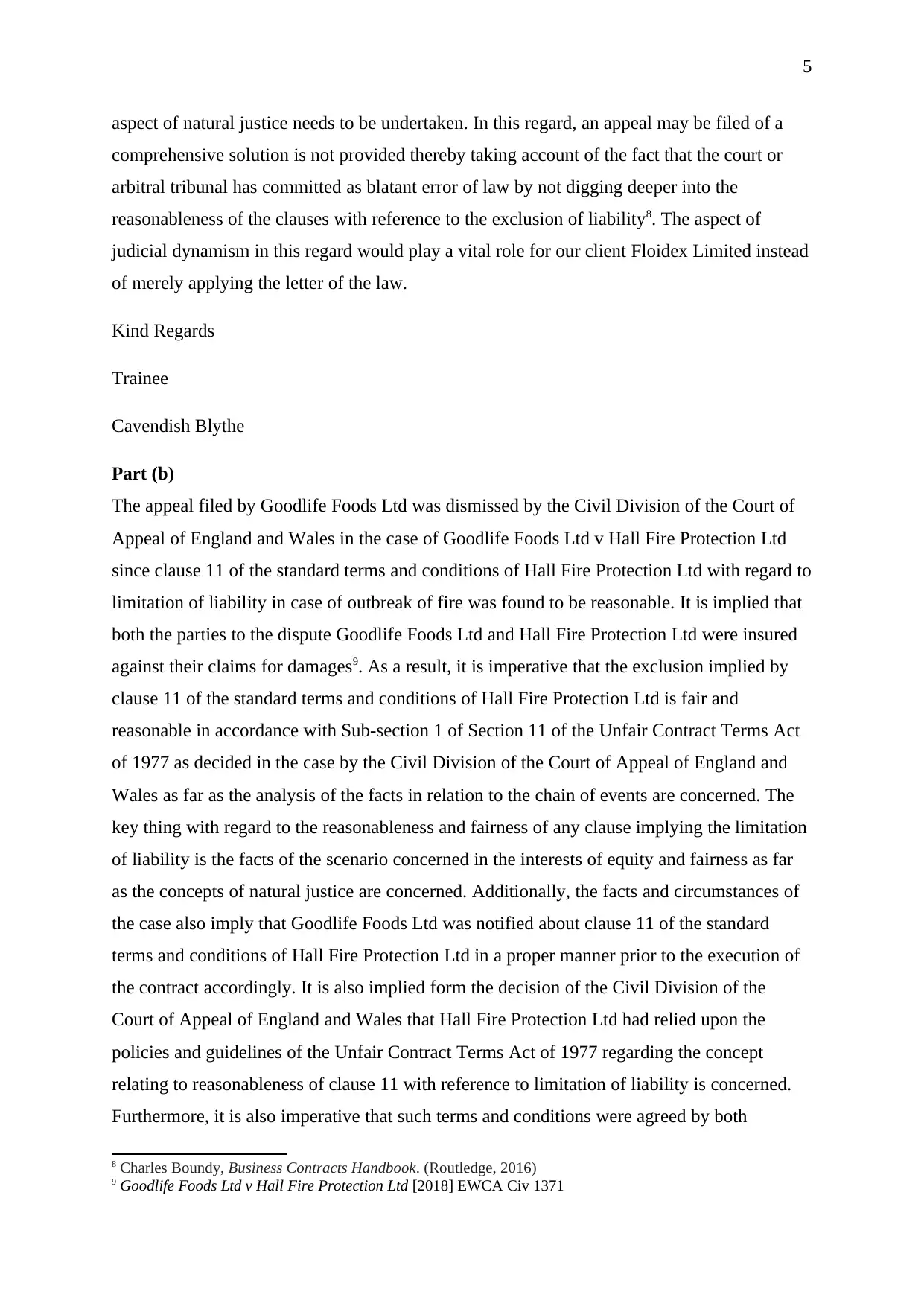
5
aspect of natural justice needs to be undertaken. In this regard, an appeal may be filed of a
comprehensive solution is not provided thereby taking account of the fact that the court or
arbitral tribunal has committed as blatant error of law by not digging deeper into the
reasonableness of the clauses with reference to the exclusion of liability8. The aspect of
judicial dynamism in this regard would play a vital role for our client Floidex Limited instead
of merely applying the letter of the law.
Kind Regards
Trainee
Cavendish Blythe
Part (b)
The appeal filed by Goodlife Foods Ltd was dismissed by the Civil Division of the Court of
Appeal of England and Wales in the case of Goodlife Foods Ltd v Hall Fire Protection Ltd
since clause 11 of the standard terms and conditions of Hall Fire Protection Ltd with regard to
limitation of liability in case of outbreak of fire was found to be reasonable. It is implied that
both the parties to the dispute Goodlife Foods Ltd and Hall Fire Protection Ltd were insured
against their claims for damages9. As a result, it is imperative that the exclusion implied by
clause 11 of the standard terms and conditions of Hall Fire Protection Ltd is fair and
reasonable in accordance with Sub-section 1 of Section 11 of the Unfair Contract Terms Act
of 1977 as decided in the case by the Civil Division of the Court of Appeal of England and
Wales as far as the analysis of the facts in relation to the chain of events are concerned. The
key thing with regard to the reasonableness and fairness of any clause implying the limitation
of liability is the facts of the scenario concerned in the interests of equity and fairness as far
as the concepts of natural justice are concerned. Additionally, the facts and circumstances of
the case also imply that Goodlife Foods Ltd was notified about clause 11 of the standard
terms and conditions of Hall Fire Protection Ltd in a proper manner prior to the execution of
the contract accordingly. It is also implied form the decision of the Civil Division of the
Court of Appeal of England and Wales that Hall Fire Protection Ltd had relied upon the
policies and guidelines of the Unfair Contract Terms Act of 1977 regarding the concept
relating to reasonableness of clause 11 with reference to limitation of liability is concerned.
Furthermore, it is also imperative that such terms and conditions were agreed by both
8 Charles Boundy, Business Contracts Handbook. (Routledge, 2016)
9 Goodlife Foods Ltd v Hall Fire Protection Ltd [2018] EWCA Civ 1371
aspect of natural justice needs to be undertaken. In this regard, an appeal may be filed of a
comprehensive solution is not provided thereby taking account of the fact that the court or
arbitral tribunal has committed as blatant error of law by not digging deeper into the
reasonableness of the clauses with reference to the exclusion of liability8. The aspect of
judicial dynamism in this regard would play a vital role for our client Floidex Limited instead
of merely applying the letter of the law.
Kind Regards
Trainee
Cavendish Blythe
Part (b)
The appeal filed by Goodlife Foods Ltd was dismissed by the Civil Division of the Court of
Appeal of England and Wales in the case of Goodlife Foods Ltd v Hall Fire Protection Ltd
since clause 11 of the standard terms and conditions of Hall Fire Protection Ltd with regard to
limitation of liability in case of outbreak of fire was found to be reasonable. It is implied that
both the parties to the dispute Goodlife Foods Ltd and Hall Fire Protection Ltd were insured
against their claims for damages9. As a result, it is imperative that the exclusion implied by
clause 11 of the standard terms and conditions of Hall Fire Protection Ltd is fair and
reasonable in accordance with Sub-section 1 of Section 11 of the Unfair Contract Terms Act
of 1977 as decided in the case by the Civil Division of the Court of Appeal of England and
Wales as far as the analysis of the facts in relation to the chain of events are concerned. The
key thing with regard to the reasonableness and fairness of any clause implying the limitation
of liability is the facts of the scenario concerned in the interests of equity and fairness as far
as the concepts of natural justice are concerned. Additionally, the facts and circumstances of
the case also imply that Goodlife Foods Ltd was notified about clause 11 of the standard
terms and conditions of Hall Fire Protection Ltd in a proper manner prior to the execution of
the contract accordingly. It is also implied form the decision of the Civil Division of the
Court of Appeal of England and Wales that Hall Fire Protection Ltd had relied upon the
policies and guidelines of the Unfair Contract Terms Act of 1977 regarding the concept
relating to reasonableness of clause 11 with reference to limitation of liability is concerned.
Furthermore, it is also imperative that such terms and conditions were agreed by both
8 Charles Boundy, Business Contracts Handbook. (Routledge, 2016)
9 Goodlife Foods Ltd v Hall Fire Protection Ltd [2018] EWCA Civ 1371
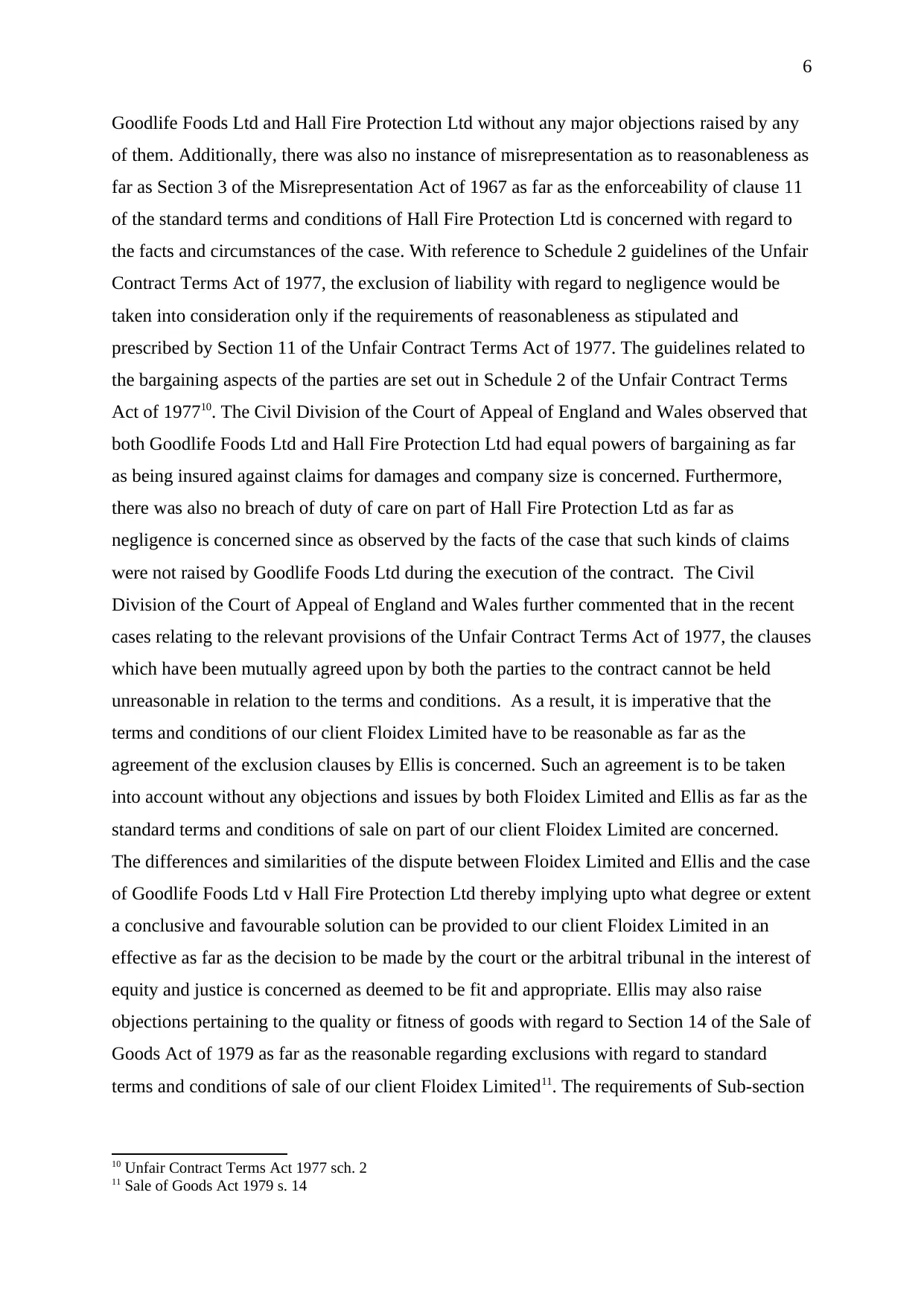
6
Goodlife Foods Ltd and Hall Fire Protection Ltd without any major objections raised by any
of them. Additionally, there was also no instance of misrepresentation as to reasonableness as
far as Section 3 of the Misrepresentation Act of 1967 as far as the enforceability of clause 11
of the standard terms and conditions of Hall Fire Protection Ltd is concerned with regard to
the facts and circumstances of the case. With reference to Schedule 2 guidelines of the Unfair
Contract Terms Act of 1977, the exclusion of liability with regard to negligence would be
taken into consideration only if the requirements of reasonableness as stipulated and
prescribed by Section 11 of the Unfair Contract Terms Act of 1977. The guidelines related to
the bargaining aspects of the parties are set out in Schedule 2 of the Unfair Contract Terms
Act of 197710. The Civil Division of the Court of Appeal of England and Wales observed that
both Goodlife Foods Ltd and Hall Fire Protection Ltd had equal powers of bargaining as far
as being insured against claims for damages and company size is concerned. Furthermore,
there was also no breach of duty of care on part of Hall Fire Protection Ltd as far as
negligence is concerned since as observed by the facts of the case that such kinds of claims
were not raised by Goodlife Foods Ltd during the execution of the contract. The Civil
Division of the Court of Appeal of England and Wales further commented that in the recent
cases relating to the relevant provisions of the Unfair Contract Terms Act of 1977, the clauses
which have been mutually agreed upon by both the parties to the contract cannot be held
unreasonable in relation to the terms and conditions. As a result, it is imperative that the
terms and conditions of our client Floidex Limited have to be reasonable as far as the
agreement of the exclusion clauses by Ellis is concerned. Such an agreement is to be taken
into account without any objections and issues by both Floidex Limited and Ellis as far as the
standard terms and conditions of sale on part of our client Floidex Limited are concerned.
The differences and similarities of the dispute between Floidex Limited and Ellis and the case
of Goodlife Foods Ltd v Hall Fire Protection Ltd thereby implying upto what degree or extent
a conclusive and favourable solution can be provided to our client Floidex Limited in an
effective as far as the decision to be made by the court or the arbitral tribunal in the interest of
equity and justice is concerned as deemed to be fit and appropriate. Ellis may also raise
objections pertaining to the quality or fitness of goods with regard to Section 14 of the Sale of
Goods Act of 1979 as far as the reasonable regarding exclusions with regard to standard
terms and conditions of sale of our client Floidex Limited11. The requirements of Sub-section
10 Unfair Contract Terms Act 1977 sch. 2
11 Sale of Goods Act 1979 s. 14
Goodlife Foods Ltd and Hall Fire Protection Ltd without any major objections raised by any
of them. Additionally, there was also no instance of misrepresentation as to reasonableness as
far as Section 3 of the Misrepresentation Act of 1967 as far as the enforceability of clause 11
of the standard terms and conditions of Hall Fire Protection Ltd is concerned with regard to
the facts and circumstances of the case. With reference to Schedule 2 guidelines of the Unfair
Contract Terms Act of 1977, the exclusion of liability with regard to negligence would be
taken into consideration only if the requirements of reasonableness as stipulated and
prescribed by Section 11 of the Unfair Contract Terms Act of 1977. The guidelines related to
the bargaining aspects of the parties are set out in Schedule 2 of the Unfair Contract Terms
Act of 197710. The Civil Division of the Court of Appeal of England and Wales observed that
both Goodlife Foods Ltd and Hall Fire Protection Ltd had equal powers of bargaining as far
as being insured against claims for damages and company size is concerned. Furthermore,
there was also no breach of duty of care on part of Hall Fire Protection Ltd as far as
negligence is concerned since as observed by the facts of the case that such kinds of claims
were not raised by Goodlife Foods Ltd during the execution of the contract. The Civil
Division of the Court of Appeal of England and Wales further commented that in the recent
cases relating to the relevant provisions of the Unfair Contract Terms Act of 1977, the clauses
which have been mutually agreed upon by both the parties to the contract cannot be held
unreasonable in relation to the terms and conditions. As a result, it is imperative that the
terms and conditions of our client Floidex Limited have to be reasonable as far as the
agreement of the exclusion clauses by Ellis is concerned. Such an agreement is to be taken
into account without any objections and issues by both Floidex Limited and Ellis as far as the
standard terms and conditions of sale on part of our client Floidex Limited are concerned.
The differences and similarities of the dispute between Floidex Limited and Ellis and the case
of Goodlife Foods Ltd v Hall Fire Protection Ltd thereby implying upto what degree or extent
a conclusive and favourable solution can be provided to our client Floidex Limited in an
effective as far as the decision to be made by the court or the arbitral tribunal in the interest of
equity and justice is concerned as deemed to be fit and appropriate. Ellis may also raise
objections pertaining to the quality or fitness of goods with regard to Section 14 of the Sale of
Goods Act of 1979 as far as the reasonable regarding exclusions with regard to standard
terms and conditions of sale of our client Floidex Limited11. The requirements of Sub-section
10 Unfair Contract Terms Act 1977 sch. 2
11 Sale of Goods Act 1979 s. 14
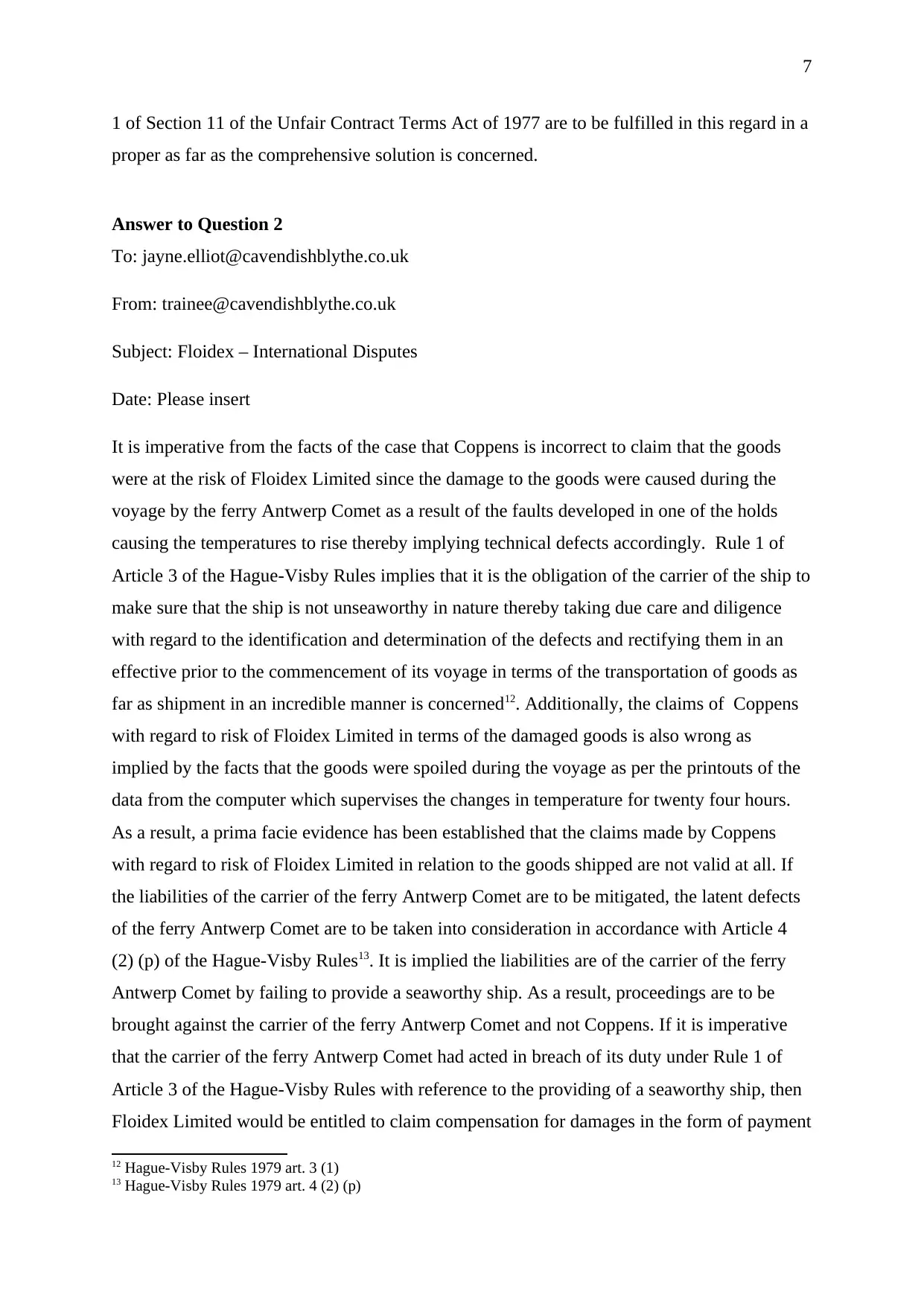
7
1 of Section 11 of the Unfair Contract Terms Act of 1977 are to be fulfilled in this regard in a
proper as far as the comprehensive solution is concerned.
Answer to Question 2
To: jayne.elliot@cavendishblythe.co.uk
From: trainee@cavendishblythe.co.uk
Subject: Floidex – International Disputes
Date: Please insert
It is imperative from the facts of the case that Coppens is incorrect to claim that the goods
were at the risk of Floidex Limited since the damage to the goods were caused during the
voyage by the ferry Antwerp Comet as a result of the faults developed in one of the holds
causing the temperatures to rise thereby implying technical defects accordingly. Rule 1 of
Article 3 of the Hague-Visby Rules implies that it is the obligation of the carrier of the ship to
make sure that the ship is not unseaworthy in nature thereby taking due care and diligence
with regard to the identification and determination of the defects and rectifying them in an
effective prior to the commencement of its voyage in terms of the transportation of goods as
far as shipment in an incredible manner is concerned12. Additionally, the claims of Coppens
with regard to risk of Floidex Limited in terms of the damaged goods is also wrong as
implied by the facts that the goods were spoiled during the voyage as per the printouts of the
data from the computer which supervises the changes in temperature for twenty four hours.
As a result, a prima facie evidence has been established that the claims made by Coppens
with regard to risk of Floidex Limited in relation to the goods shipped are not valid at all. If
the liabilities of the carrier of the ferry Antwerp Comet are to be mitigated, the latent defects
of the ferry Antwerp Comet are to be taken into consideration in accordance with Article 4
(2) (p) of the Hague-Visby Rules13. It is implied the liabilities are of the carrier of the ferry
Antwerp Comet by failing to provide a seaworthy ship. As a result, proceedings are to be
brought against the carrier of the ferry Antwerp Comet and not Coppens. If it is imperative
that the carrier of the ferry Antwerp Comet had acted in breach of its duty under Rule 1 of
Article 3 of the Hague-Visby Rules with reference to the providing of a seaworthy ship, then
Floidex Limited would be entitled to claim compensation for damages in the form of payment
12 Hague-Visby Rules 1979 art. 3 (1)
13 Hague-Visby Rules 1979 art. 4 (2) (p)
1 of Section 11 of the Unfair Contract Terms Act of 1977 are to be fulfilled in this regard in a
proper as far as the comprehensive solution is concerned.
Answer to Question 2
To: jayne.elliot@cavendishblythe.co.uk
From: trainee@cavendishblythe.co.uk
Subject: Floidex – International Disputes
Date: Please insert
It is imperative from the facts of the case that Coppens is incorrect to claim that the goods
were at the risk of Floidex Limited since the damage to the goods were caused during the
voyage by the ferry Antwerp Comet as a result of the faults developed in one of the holds
causing the temperatures to rise thereby implying technical defects accordingly. Rule 1 of
Article 3 of the Hague-Visby Rules implies that it is the obligation of the carrier of the ship to
make sure that the ship is not unseaworthy in nature thereby taking due care and diligence
with regard to the identification and determination of the defects and rectifying them in an
effective prior to the commencement of its voyage in terms of the transportation of goods as
far as shipment in an incredible manner is concerned12. Additionally, the claims of Coppens
with regard to risk of Floidex Limited in terms of the damaged goods is also wrong as
implied by the facts that the goods were spoiled during the voyage as per the printouts of the
data from the computer which supervises the changes in temperature for twenty four hours.
As a result, a prima facie evidence has been established that the claims made by Coppens
with regard to risk of Floidex Limited in relation to the goods shipped are not valid at all. If
the liabilities of the carrier of the ferry Antwerp Comet are to be mitigated, the latent defects
of the ferry Antwerp Comet are to be taken into consideration in accordance with Article 4
(2) (p) of the Hague-Visby Rules13. It is implied the liabilities are of the carrier of the ferry
Antwerp Comet by failing to provide a seaworthy ship. As a result, proceedings are to be
brought against the carrier of the ferry Antwerp Comet and not Coppens. If it is imperative
that the carrier of the ferry Antwerp Comet had acted in breach of its duty under Rule 1 of
Article 3 of the Hague-Visby Rules with reference to the providing of a seaworthy ship, then
Floidex Limited would be entitled to claim compensation for damages in the form of payment
12 Hague-Visby Rules 1979 art. 3 (1)
13 Hague-Visby Rules 1979 art. 4 (2) (p)
Paraphrase This Document
Need a fresh take? Get an instant paraphrase of this document with our AI Paraphraser
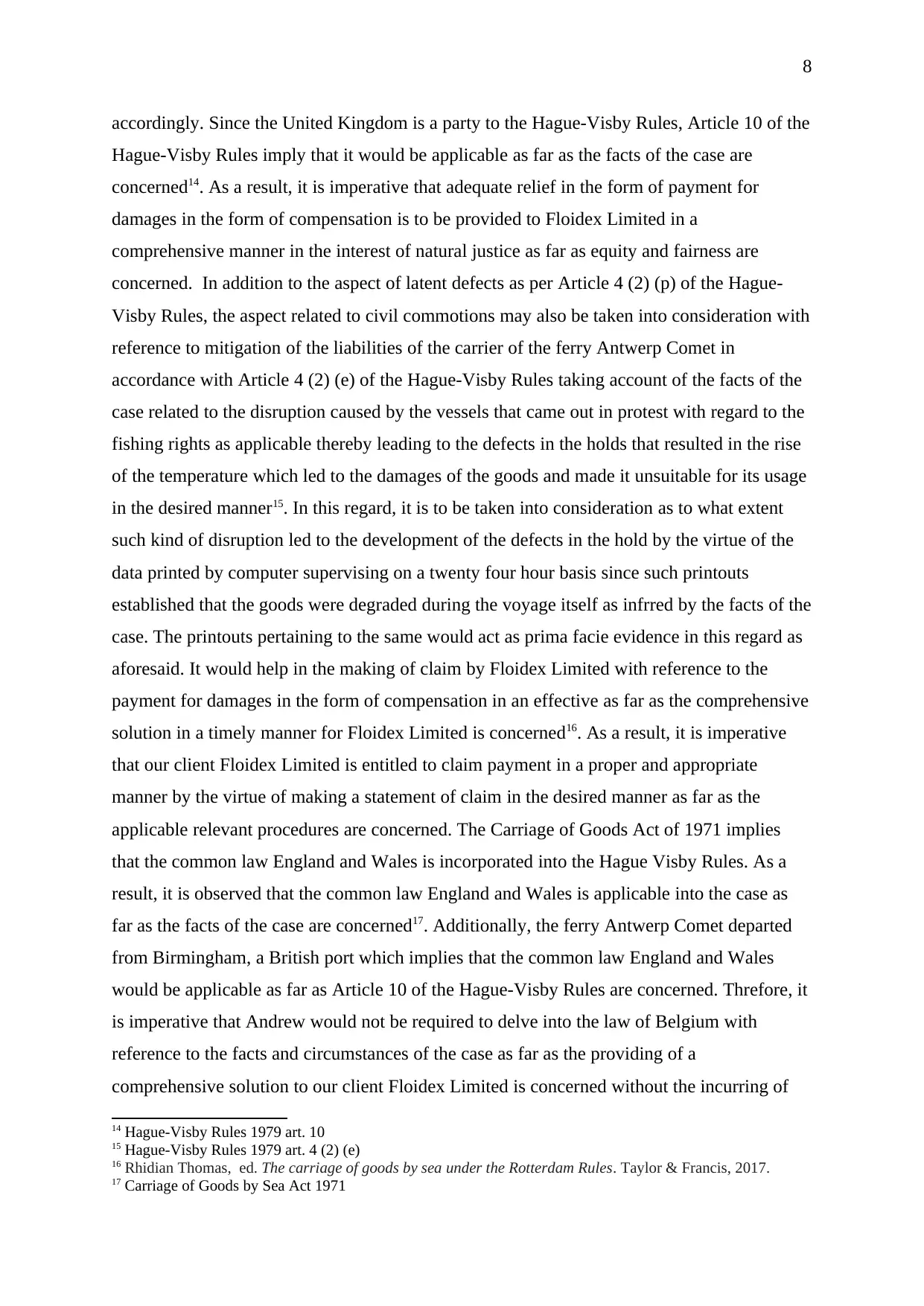
8
accordingly. Since the United Kingdom is a party to the Hague-Visby Rules, Article 10 of the
Hague-Visby Rules imply that it would be applicable as far as the facts of the case are
concerned14. As a result, it is imperative that adequate relief in the form of payment for
damages in the form of compensation is to be provided to Floidex Limited in a
comprehensive manner in the interest of natural justice as far as equity and fairness are
concerned. In addition to the aspect of latent defects as per Article 4 (2) (p) of the Hague-
Visby Rules, the aspect related to civil commotions may also be taken into consideration with
reference to mitigation of the liabilities of the carrier of the ferry Antwerp Comet in
accordance with Article 4 (2) (e) of the Hague-Visby Rules taking account of the facts of the
case related to the disruption caused by the vessels that came out in protest with regard to the
fishing rights as applicable thereby leading to the defects in the holds that resulted in the rise
of the temperature which led to the damages of the goods and made it unsuitable for its usage
in the desired manner15. In this regard, it is to be taken into consideration as to what extent
such kind of disruption led to the development of the defects in the hold by the virtue of the
data printed by computer supervising on a twenty four hour basis since such printouts
established that the goods were degraded during the voyage itself as infrred by the facts of the
case. The printouts pertaining to the same would act as prima facie evidence in this regard as
aforesaid. It would help in the making of claim by Floidex Limited with reference to the
payment for damages in the form of compensation in an effective as far as the comprehensive
solution in a timely manner for Floidex Limited is concerned16. As a result, it is imperative
that our client Floidex Limited is entitled to claim payment in a proper and appropriate
manner by the virtue of making a statement of claim in the desired manner as far as the
applicable relevant procedures are concerned. The Carriage of Goods Act of 1971 implies
that the common law England and Wales is incorporated into the Hague Visby Rules. As a
result, it is observed that the common law England and Wales is applicable into the case as
far as the facts of the case are concerned17. Additionally, the ferry Antwerp Comet departed
from Birmingham, a British port which implies that the common law England and Wales
would be applicable as far as Article 10 of the Hague-Visby Rules are concerned. Threfore, it
is imperative that Andrew would not be required to delve into the law of Belgium with
reference to the facts and circumstances of the case as far as the providing of a
comprehensive solution to our client Floidex Limited is concerned without the incurring of
14 Hague-Visby Rules 1979 art. 10
15 Hague-Visby Rules 1979 art. 4 (2) (e)
16 Rhidian Thomas, ed. The carriage of goods by sea under the Rotterdam Rules. Taylor & Francis, 2017.
17 Carriage of Goods by Sea Act 1971
accordingly. Since the United Kingdom is a party to the Hague-Visby Rules, Article 10 of the
Hague-Visby Rules imply that it would be applicable as far as the facts of the case are
concerned14. As a result, it is imperative that adequate relief in the form of payment for
damages in the form of compensation is to be provided to Floidex Limited in a
comprehensive manner in the interest of natural justice as far as equity and fairness are
concerned. In addition to the aspect of latent defects as per Article 4 (2) (p) of the Hague-
Visby Rules, the aspect related to civil commotions may also be taken into consideration with
reference to mitigation of the liabilities of the carrier of the ferry Antwerp Comet in
accordance with Article 4 (2) (e) of the Hague-Visby Rules taking account of the facts of the
case related to the disruption caused by the vessels that came out in protest with regard to the
fishing rights as applicable thereby leading to the defects in the holds that resulted in the rise
of the temperature which led to the damages of the goods and made it unsuitable for its usage
in the desired manner15. In this regard, it is to be taken into consideration as to what extent
such kind of disruption led to the development of the defects in the hold by the virtue of the
data printed by computer supervising on a twenty four hour basis since such printouts
established that the goods were degraded during the voyage itself as infrred by the facts of the
case. The printouts pertaining to the same would act as prima facie evidence in this regard as
aforesaid. It would help in the making of claim by Floidex Limited with reference to the
payment for damages in the form of compensation in an effective as far as the comprehensive
solution in a timely manner for Floidex Limited is concerned16. As a result, it is imperative
that our client Floidex Limited is entitled to claim payment in a proper and appropriate
manner by the virtue of making a statement of claim in the desired manner as far as the
applicable relevant procedures are concerned. The Carriage of Goods Act of 1971 implies
that the common law England and Wales is incorporated into the Hague Visby Rules. As a
result, it is observed that the common law England and Wales is applicable into the case as
far as the facts of the case are concerned17. Additionally, the ferry Antwerp Comet departed
from Birmingham, a British port which implies that the common law England and Wales
would be applicable as far as Article 10 of the Hague-Visby Rules are concerned. Threfore, it
is imperative that Andrew would not be required to delve into the law of Belgium with
reference to the facts and circumstances of the case as far as the providing of a
comprehensive solution to our client Floidex Limited is concerned without the incurring of
14 Hague-Visby Rules 1979 art. 10
15 Hague-Visby Rules 1979 art. 4 (2) (e)
16 Rhidian Thomas, ed. The carriage of goods by sea under the Rotterdam Rules. Taylor & Francis, 2017.
17 Carriage of Goods by Sea Act 1971
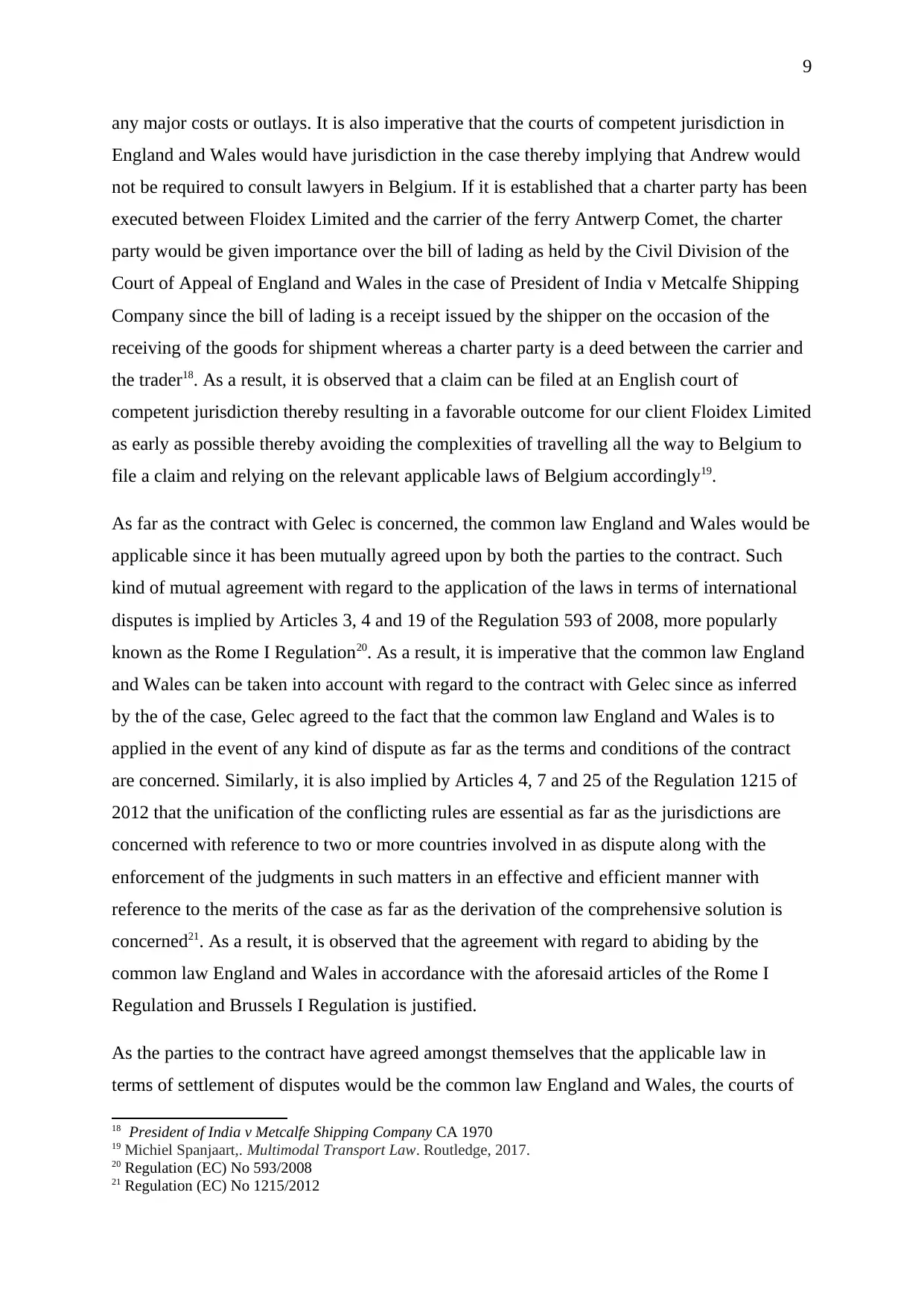
9
any major costs or outlays. It is also imperative that the courts of competent jurisdiction in
England and Wales would have jurisdiction in the case thereby implying that Andrew would
not be required to consult lawyers in Belgium. If it is established that a charter party has been
executed between Floidex Limited and the carrier of the ferry Antwerp Comet, the charter
party would be given importance over the bill of lading as held by the Civil Division of the
Court of Appeal of England and Wales in the case of President of India v Metcalfe Shipping
Company since the bill of lading is a receipt issued by the shipper on the occasion of the
receiving of the goods for shipment whereas a charter party is a deed between the carrier and
the trader18. As a result, it is observed that a claim can be filed at an English court of
competent jurisdiction thereby resulting in a favorable outcome for our client Floidex Limited
as early as possible thereby avoiding the complexities of travelling all the way to Belgium to
file a claim and relying on the relevant applicable laws of Belgium accordingly19.
As far as the contract with Gelec is concerned, the common law England and Wales would be
applicable since it has been mutually agreed upon by both the parties to the contract. Such
kind of mutual agreement with regard to the application of the laws in terms of international
disputes is implied by Articles 3, 4 and 19 of the Regulation 593 of 2008, more popularly
known as the Rome I Regulation20. As a result, it is imperative that the common law England
and Wales can be taken into account with regard to the contract with Gelec since as inferred
by the of the case, Gelec agreed to the fact that the common law England and Wales is to
applied in the event of any kind of dispute as far as the terms and conditions of the contract
are concerned. Similarly, it is also implied by Articles 4, 7 and 25 of the Regulation 1215 of
2012 that the unification of the conflicting rules are essential as far as the jurisdictions are
concerned with reference to two or more countries involved in as dispute along with the
enforcement of the judgments in such matters in an effective and efficient manner with
reference to the merits of the case as far as the derivation of the comprehensive solution is
concerned21. As a result, it is observed that the agreement with regard to abiding by the
common law England and Wales in accordance with the aforesaid articles of the Rome I
Regulation and Brussels I Regulation is justified.
As the parties to the contract have agreed amongst themselves that the applicable law in
terms of settlement of disputes would be the common law England and Wales, the courts of
18 President of India v Metcalfe Shipping Company CA 1970
19 Michiel Spanjaart,. Multimodal Transport Law. Routledge, 2017.
20 Regulation (EC) No 593/2008
21 Regulation (EC) No 1215/2012
any major costs or outlays. It is also imperative that the courts of competent jurisdiction in
England and Wales would have jurisdiction in the case thereby implying that Andrew would
not be required to consult lawyers in Belgium. If it is established that a charter party has been
executed between Floidex Limited and the carrier of the ferry Antwerp Comet, the charter
party would be given importance over the bill of lading as held by the Civil Division of the
Court of Appeal of England and Wales in the case of President of India v Metcalfe Shipping
Company since the bill of lading is a receipt issued by the shipper on the occasion of the
receiving of the goods for shipment whereas a charter party is a deed between the carrier and
the trader18. As a result, it is observed that a claim can be filed at an English court of
competent jurisdiction thereby resulting in a favorable outcome for our client Floidex Limited
as early as possible thereby avoiding the complexities of travelling all the way to Belgium to
file a claim and relying on the relevant applicable laws of Belgium accordingly19.
As far as the contract with Gelec is concerned, the common law England and Wales would be
applicable since it has been mutually agreed upon by both the parties to the contract. Such
kind of mutual agreement with regard to the application of the laws in terms of international
disputes is implied by Articles 3, 4 and 19 of the Regulation 593 of 2008, more popularly
known as the Rome I Regulation20. As a result, it is imperative that the common law England
and Wales can be taken into account with regard to the contract with Gelec since as inferred
by the of the case, Gelec agreed to the fact that the common law England and Wales is to
applied in the event of any kind of dispute as far as the terms and conditions of the contract
are concerned. Similarly, it is also implied by Articles 4, 7 and 25 of the Regulation 1215 of
2012 that the unification of the conflicting rules are essential as far as the jurisdictions are
concerned with reference to two or more countries involved in as dispute along with the
enforcement of the judgments in such matters in an effective and efficient manner with
reference to the merits of the case as far as the derivation of the comprehensive solution is
concerned21. As a result, it is observed that the agreement with regard to abiding by the
common law England and Wales in accordance with the aforesaid articles of the Rome I
Regulation and Brussels I Regulation is justified.
As the parties to the contract have agreed amongst themselves that the applicable law in
terms of settlement of disputes would be the common law England and Wales, the courts of
18 President of India v Metcalfe Shipping Company CA 1970
19 Michiel Spanjaart,. Multimodal Transport Law. Routledge, 2017.
20 Regulation (EC) No 593/2008
21 Regulation (EC) No 1215/2012
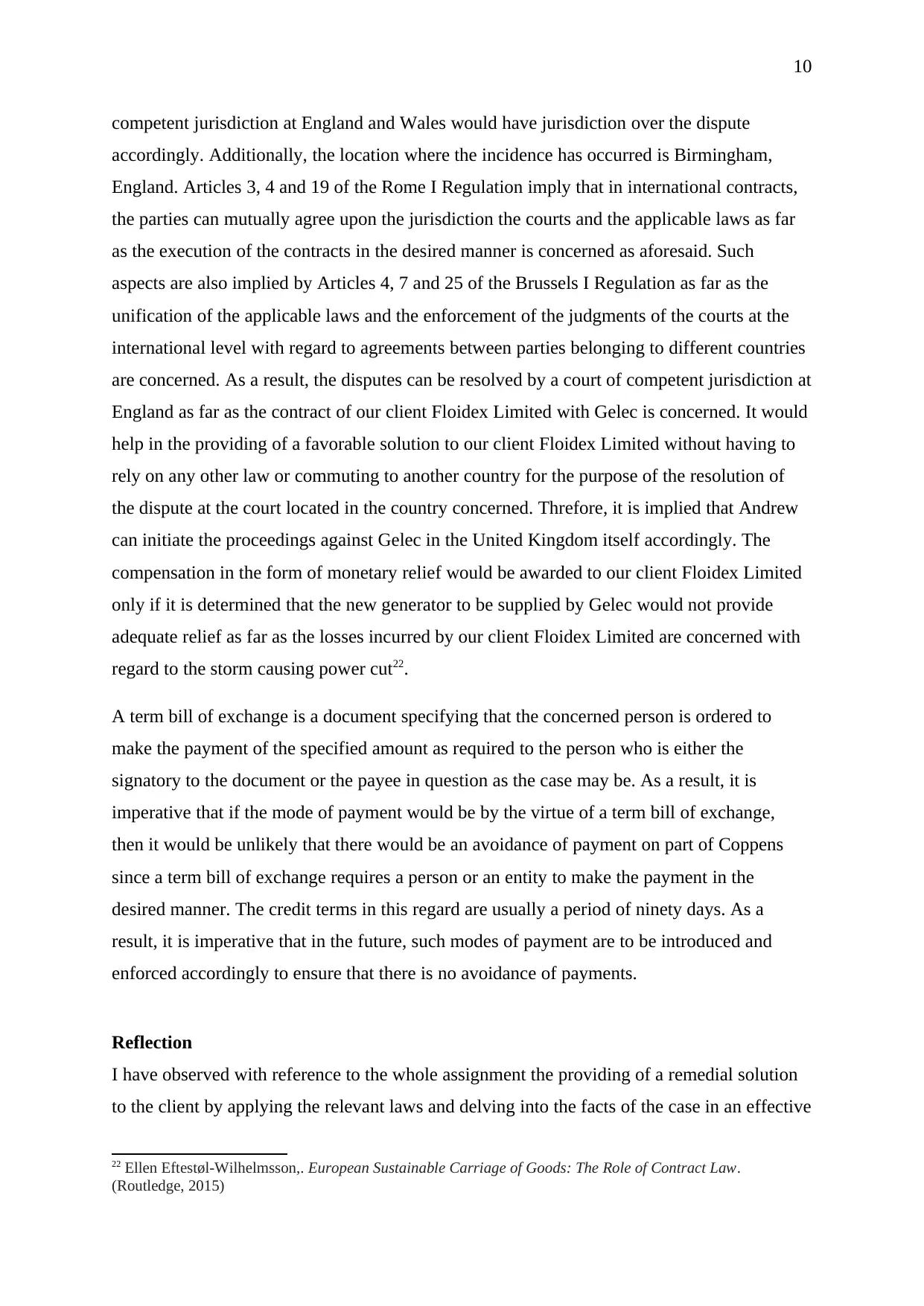
10
competent jurisdiction at England and Wales would have jurisdiction over the dispute
accordingly. Additionally, the location where the incidence has occurred is Birmingham,
England. Articles 3, 4 and 19 of the Rome I Regulation imply that in international contracts,
the parties can mutually agree upon the jurisdiction the courts and the applicable laws as far
as the execution of the contracts in the desired manner is concerned as aforesaid. Such
aspects are also implied by Articles 4, 7 and 25 of the Brussels I Regulation as far as the
unification of the applicable laws and the enforcement of the judgments of the courts at the
international level with regard to agreements between parties belonging to different countries
are concerned. As a result, the disputes can be resolved by a court of competent jurisdiction at
England as far as the contract of our client Floidex Limited with Gelec is concerned. It would
help in the providing of a favorable solution to our client Floidex Limited without having to
rely on any other law or commuting to another country for the purpose of the resolution of
the dispute at the court located in the country concerned. Threfore, it is implied that Andrew
can initiate the proceedings against Gelec in the United Kingdom itself accordingly. The
compensation in the form of monetary relief would be awarded to our client Floidex Limited
only if it is determined that the new generator to be supplied by Gelec would not provide
adequate relief as far as the losses incurred by our client Floidex Limited are concerned with
regard to the storm causing power cut22.
A term bill of exchange is a document specifying that the concerned person is ordered to
make the payment of the specified amount as required to the person who is either the
signatory to the document or the payee in question as the case may be. As a result, it is
imperative that if the mode of payment would be by the virtue of a term bill of exchange,
then it would be unlikely that there would be an avoidance of payment on part of Coppens
since a term bill of exchange requires a person or an entity to make the payment in the
desired manner. The credit terms in this regard are usually a period of ninety days. As a
result, it is imperative that in the future, such modes of payment are to be introduced and
enforced accordingly to ensure that there is no avoidance of payments.
Reflection
I have observed with reference to the whole assignment the providing of a remedial solution
to the client by applying the relevant laws and delving into the facts of the case in an effective
22 Ellen Eftestøl-Wilhelmsson,. European Sustainable Carriage of Goods: The Role of Contract Law.
(Routledge, 2015)
competent jurisdiction at England and Wales would have jurisdiction over the dispute
accordingly. Additionally, the location where the incidence has occurred is Birmingham,
England. Articles 3, 4 and 19 of the Rome I Regulation imply that in international contracts,
the parties can mutually agree upon the jurisdiction the courts and the applicable laws as far
as the execution of the contracts in the desired manner is concerned as aforesaid. Such
aspects are also implied by Articles 4, 7 and 25 of the Brussels I Regulation as far as the
unification of the applicable laws and the enforcement of the judgments of the courts at the
international level with regard to agreements between parties belonging to different countries
are concerned. As a result, the disputes can be resolved by a court of competent jurisdiction at
England as far as the contract of our client Floidex Limited with Gelec is concerned. It would
help in the providing of a favorable solution to our client Floidex Limited without having to
rely on any other law or commuting to another country for the purpose of the resolution of
the dispute at the court located in the country concerned. Threfore, it is implied that Andrew
can initiate the proceedings against Gelec in the United Kingdom itself accordingly. The
compensation in the form of monetary relief would be awarded to our client Floidex Limited
only if it is determined that the new generator to be supplied by Gelec would not provide
adequate relief as far as the losses incurred by our client Floidex Limited are concerned with
regard to the storm causing power cut22.
A term bill of exchange is a document specifying that the concerned person is ordered to
make the payment of the specified amount as required to the person who is either the
signatory to the document or the payee in question as the case may be. As a result, it is
imperative that if the mode of payment would be by the virtue of a term bill of exchange,
then it would be unlikely that there would be an avoidance of payment on part of Coppens
since a term bill of exchange requires a person or an entity to make the payment in the
desired manner. The credit terms in this regard are usually a period of ninety days. As a
result, it is imperative that in the future, such modes of payment are to be introduced and
enforced accordingly to ensure that there is no avoidance of payments.
Reflection
I have observed with reference to the whole assignment the providing of a remedial solution
to the client by applying the relevant laws and delving into the facts of the case in an effective
22 Ellen Eftestøl-Wilhelmsson,. European Sustainable Carriage of Goods: The Role of Contract Law.
(Routledge, 2015)
Secure Best Marks with AI Grader
Need help grading? Try our AI Grader for instant feedback on your assignments.
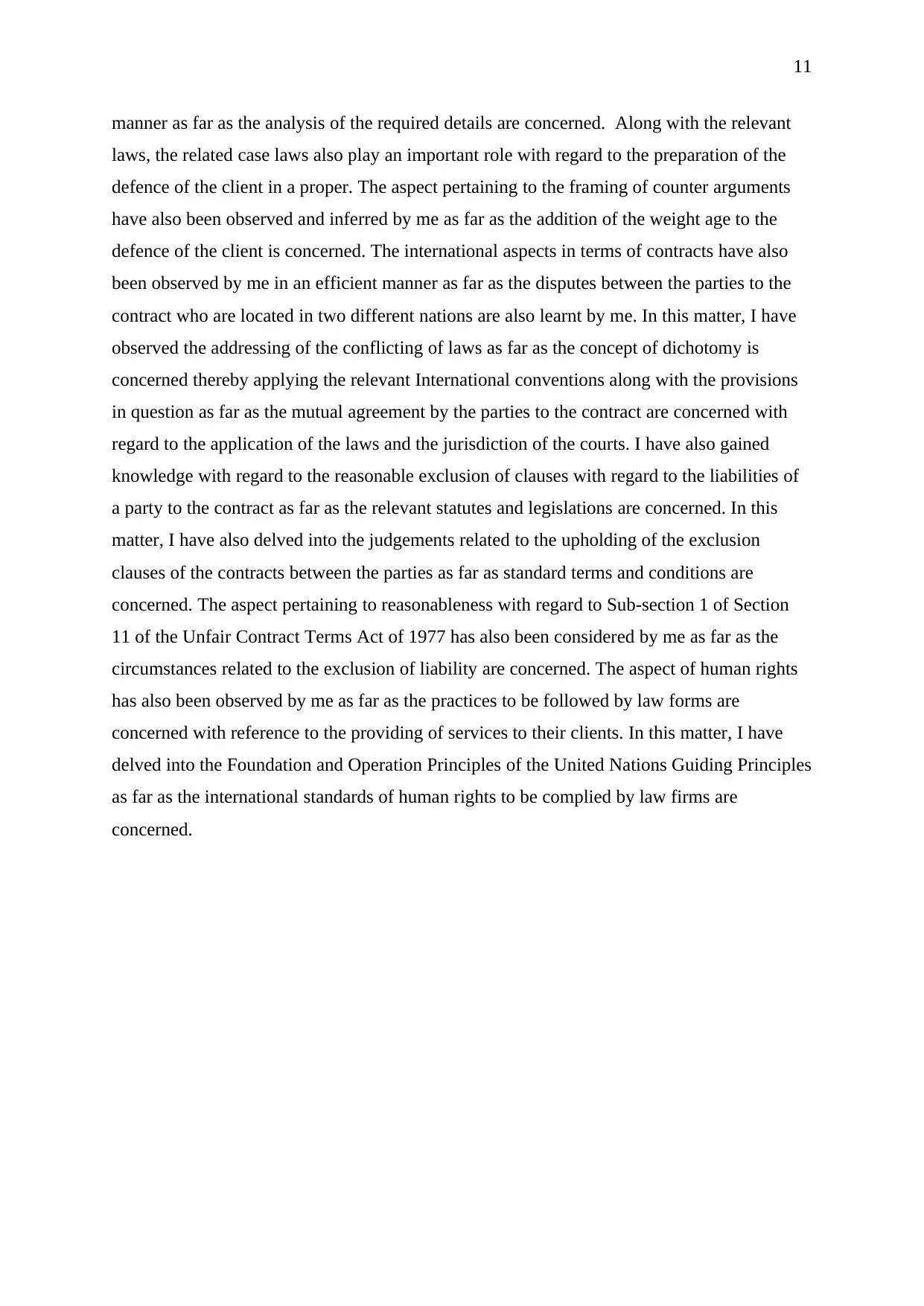
11
manner as far as the analysis of the required details are concerned. Along with the relevant
laws, the related case laws also play an important role with regard to the preparation of the
defence of the client in a proper. The aspect pertaining to the framing of counter arguments
have also been observed and inferred by me as far as the addition of the weight age to the
defence of the client is concerned. The international aspects in terms of contracts have also
been observed by me in an efficient manner as far as the disputes between the parties to the
contract who are located in two different nations are also learnt by me. In this matter, I have
observed the addressing of the conflicting of laws as far as the concept of dichotomy is
concerned thereby applying the relevant International conventions along with the provisions
in question as far as the mutual agreement by the parties to the contract are concerned with
regard to the application of the laws and the jurisdiction of the courts. I have also gained
knowledge with regard to the reasonable exclusion of clauses with regard to the liabilities of
a party to the contract as far as the relevant statutes and legislations are concerned. In this
matter, I have also delved into the judgements related to the upholding of the exclusion
clauses of the contracts between the parties as far as standard terms and conditions are
concerned. The aspect pertaining to reasonableness with regard to Sub-section 1 of Section
11 of the Unfair Contract Terms Act of 1977 has also been considered by me as far as the
circumstances related to the exclusion of liability are concerned. The aspect of human rights
has also been observed by me as far as the practices to be followed by law forms are
concerned with reference to the providing of services to their clients. In this matter, I have
delved into the Foundation and Operation Principles of the United Nations Guiding Principles
as far as the international standards of human rights to be complied by law firms are
concerned.
manner as far as the analysis of the required details are concerned. Along with the relevant
laws, the related case laws also play an important role with regard to the preparation of the
defence of the client in a proper. The aspect pertaining to the framing of counter arguments
have also been observed and inferred by me as far as the addition of the weight age to the
defence of the client is concerned. The international aspects in terms of contracts have also
been observed by me in an efficient manner as far as the disputes between the parties to the
contract who are located in two different nations are also learnt by me. In this matter, I have
observed the addressing of the conflicting of laws as far as the concept of dichotomy is
concerned thereby applying the relevant International conventions along with the provisions
in question as far as the mutual agreement by the parties to the contract are concerned with
regard to the application of the laws and the jurisdiction of the courts. I have also gained
knowledge with regard to the reasonable exclusion of clauses with regard to the liabilities of
a party to the contract as far as the relevant statutes and legislations are concerned. In this
matter, I have also delved into the judgements related to the upholding of the exclusion
clauses of the contracts between the parties as far as standard terms and conditions are
concerned. The aspect pertaining to reasonableness with regard to Sub-section 1 of Section
11 of the Unfair Contract Terms Act of 1977 has also been considered by me as far as the
circumstances related to the exclusion of liability are concerned. The aspect of human rights
has also been observed by me as far as the practices to be followed by law forms are
concerned with reference to the providing of services to their clients. In this matter, I have
delved into the Foundation and Operation Principles of the United Nations Guiding Principles
as far as the international standards of human rights to be complied by law firms are
concerned.
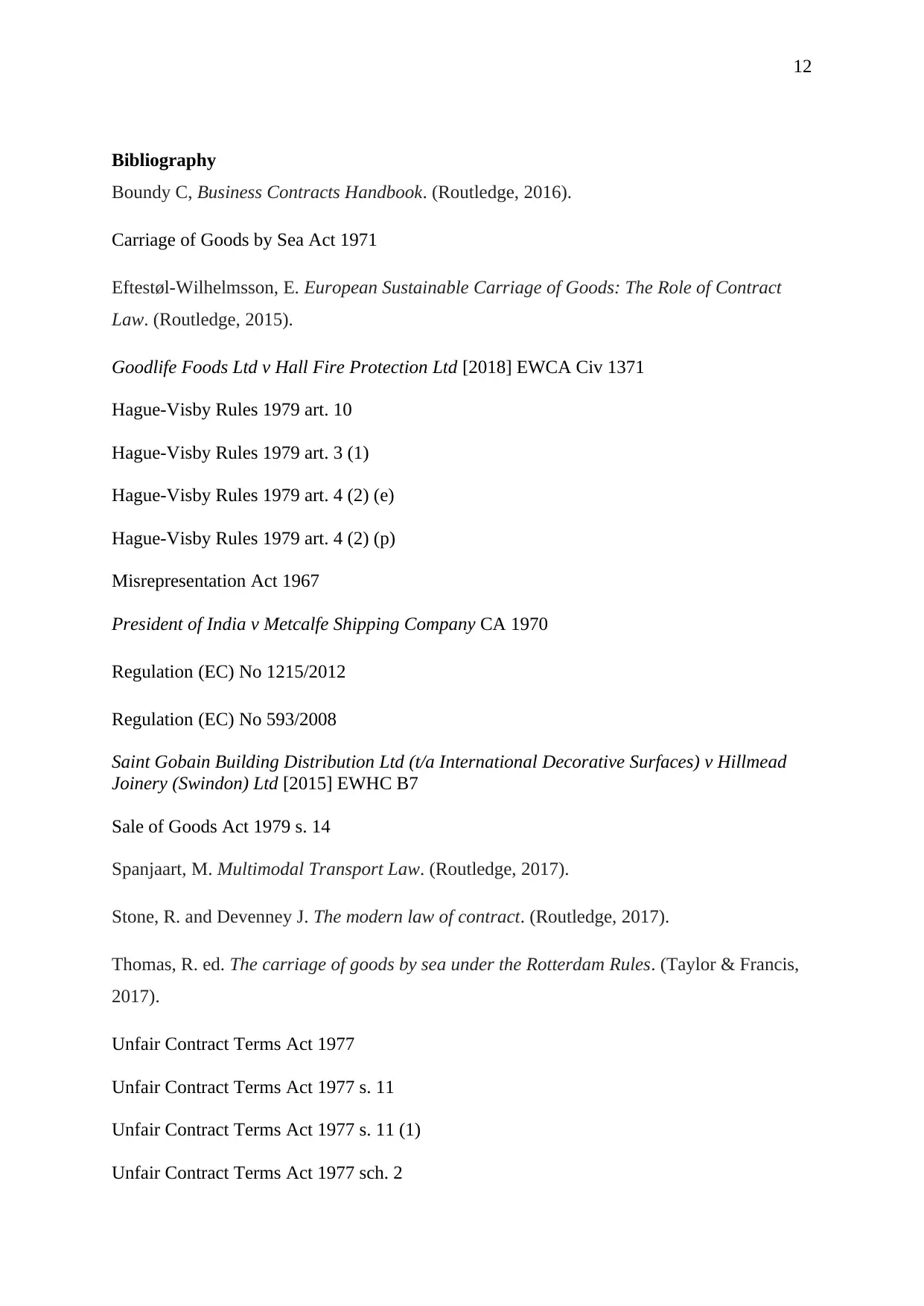
12
Bibliography
Boundy C, Business Contracts Handbook. (Routledge, 2016).
Carriage of Goods by Sea Act 1971
Eftestøl-Wilhelmsson, E. European Sustainable Carriage of Goods: The Role of Contract
Law. (Routledge, 2015).
Goodlife Foods Ltd v Hall Fire Protection Ltd [2018] EWCA Civ 1371
Hague-Visby Rules 1979 art. 10
Hague-Visby Rules 1979 art. 3 (1)
Hague-Visby Rules 1979 art. 4 (2) (e)
Hague-Visby Rules 1979 art. 4 (2) (p)
Misrepresentation Act 1967
President of India v Metcalfe Shipping Company CA 1970
Regulation (EC) No 1215/2012
Regulation (EC) No 593/2008
Saint Gobain Building Distribution Ltd (t/a International Decorative Surfaces) v Hillmead
Joinery (Swindon) Ltd [2015] EWHC B7
Sale of Goods Act 1979 s. 14
Spanjaart, M. Multimodal Transport Law. (Routledge, 2017).
Stone, R. and Devenney J. The modern law of contract. (Routledge, 2017).
Thomas, R. ed. The carriage of goods by sea under the Rotterdam Rules. (Taylor & Francis,
2017).
Unfair Contract Terms Act 1977
Unfair Contract Terms Act 1977 s. 11
Unfair Contract Terms Act 1977 s. 11 (1)
Unfair Contract Terms Act 1977 sch. 2
Bibliography
Boundy C, Business Contracts Handbook. (Routledge, 2016).
Carriage of Goods by Sea Act 1971
Eftestøl-Wilhelmsson, E. European Sustainable Carriage of Goods: The Role of Contract
Law. (Routledge, 2015).
Goodlife Foods Ltd v Hall Fire Protection Ltd [2018] EWCA Civ 1371
Hague-Visby Rules 1979 art. 10
Hague-Visby Rules 1979 art. 3 (1)
Hague-Visby Rules 1979 art. 4 (2) (e)
Hague-Visby Rules 1979 art. 4 (2) (p)
Misrepresentation Act 1967
President of India v Metcalfe Shipping Company CA 1970
Regulation (EC) No 1215/2012
Regulation (EC) No 593/2008
Saint Gobain Building Distribution Ltd (t/a International Decorative Surfaces) v Hillmead
Joinery (Swindon) Ltd [2015] EWHC B7
Sale of Goods Act 1979 s. 14
Spanjaart, M. Multimodal Transport Law. (Routledge, 2017).
Stone, R. and Devenney J. The modern law of contract. (Routledge, 2017).
Thomas, R. ed. The carriage of goods by sea under the Rotterdam Rules. (Taylor & Francis,
2017).
Unfair Contract Terms Act 1977
Unfair Contract Terms Act 1977 s. 11
Unfair Contract Terms Act 1977 s. 11 (1)
Unfair Contract Terms Act 1977 sch. 2
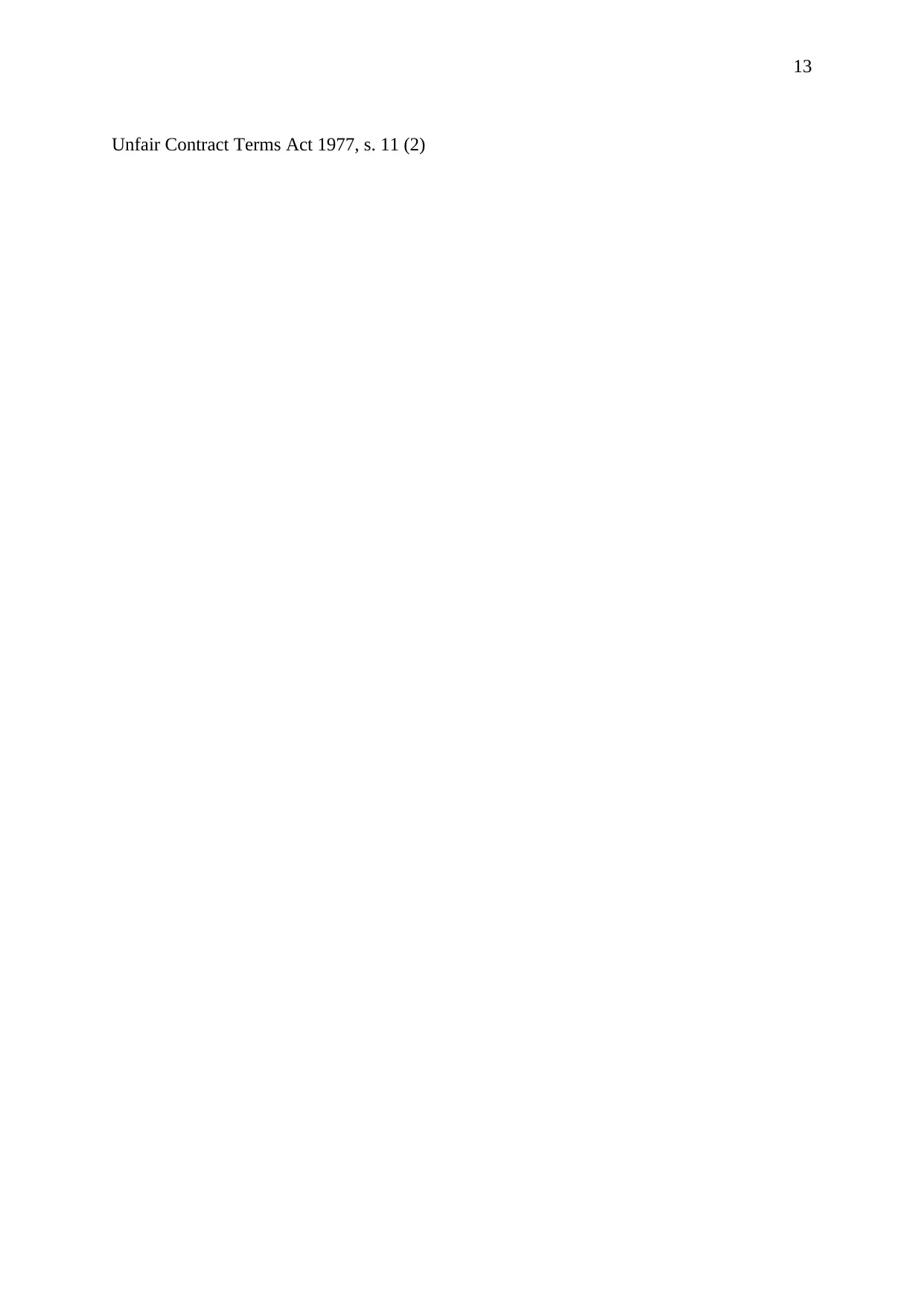
13
Unfair Contract Terms Act 1977, s. 11 (2)
Unfair Contract Terms Act 1977, s. 11 (2)
1 out of 13
Your All-in-One AI-Powered Toolkit for Academic Success.
+13062052269
info@desklib.com
Available 24*7 on WhatsApp / Email
![[object Object]](/_next/static/media/star-bottom.7253800d.svg)
Unlock your academic potential
© 2024 | Zucol Services PVT LTD | All rights reserved.



